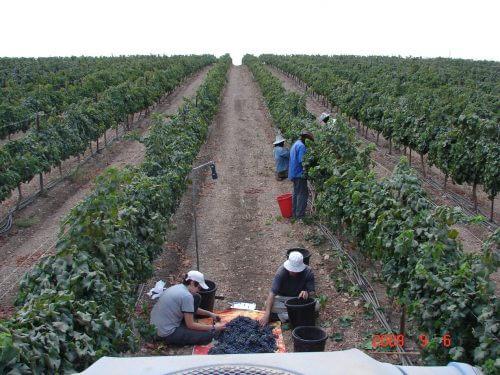It turns out that plants have "memory", that is, plants "remember" what was embedded in their anatomy. The memory mechanism is deeply embedded in the diameter of the acetabulum, which are actually tubes made up of dead cells that transfer the water from the roots to the leaves. The discovery enables precise irrigation of vines to create better quality red wines

A study by the Mizrah Regional R&D at Ariel University, in collaboration with the Hebrew University, published in the American Journal of Botany magazine about the ability to control the quality of wine.
To get a better quality wine, it is necessary to "thirst" the vines. But the "thirst" must be carried out in a balanced manner in order not to harm the plants and crops. The balance between the "thirst" action and the creation of a good quality wine so that the crop is not damaged, and the quality will still be good - this is the secret of the success of a quality wine.
When the vines are watered as wide as the grapes are large and fat, a bland and flat red wine with rosy colors will come out. A plant that undergoes drought (stress) produces color, taste and smell substances that give the wine uniqueness and quality. It is relatively easy to get a high quality grape crop that is considered poor for wine production - simply irrigate with a lot of water, on the other hand, to create excessive stress, and to make the vines very "thirsty" can damage the vine and the crop. The big question is how much to water to create the right balance. The recommendation of the research team is to pamper (relatively) the vines at the beginning of the season and dry them at the end of the season.
The developed technologies allow accurate quantitative measurement of the amount of water the plant consumes each and every day, as well as measuring and determining the characteristics of the desired drought stress - when the plant actually "tells" us what its needs are to create quality wine and prevent significant damage. The research was done by Sharel Munitz, a doctoral student from Mizrah Regional Research and Development in Ariel under the joint guidance of Prof. Amnon Schwartz from the Hebrew University, Dr. Yishai Netzer and Dr. Ilana Stein from Mizrah Regional Research and Development in Ariel and Ariel University.
It turns out that plants have "memory", that is, plants "remember" what was embedded in their anatomy. The memory mechanism is deeply embedded in the diameter of the sapwood, which are essentially tubes composed of dead cells that transport the water from the roots to the leaves.
The plant actually spreads risks: on the one hand, it produces wide pipes that allow large amounts of water to be transported, but which are at risk of the entry of air bubbles, which clog them, in contrast to the creation of narrow pipes that carry much less water but are resistant to air leaks even in severe drought conditions (source "Insurance Certificate" ).
By controlling the weeding, the diameters of the pipes can be tilted, for example a plant that was watered in excess will produce wider pipes and a plant that is exposed to continuous weeding will produce narrower pipes. In the irrigation method that was developed, the pipeline that opens the vine is relatively wide, which actually results in high sensitivity and the ability to produce vines at the desired time for the farmer and winemaker, only in a limited time frame of about a month before the grape harvest. In such a situation, a balance is actually obtained between a vine that bears an improved crop but also an improved wine quality.
In the scientific literature, there is very limited information regarding the effect of drought stress on the development of the shoot system of mature vines, and the consequences on the plant's ability to cope with drought. In the current study, the team of researchers examined for 4 years the effects of several irrigation interfaces on the anatomy and hydraulics of the shoot system in a variety of Merlot wine grape vines growing in Kibbutz Hula in the vineyards of Barkan Winery.
The conclusions from the current research that through the anatomy of the stipule there is a memory mechanism that will determine the sensitivity of the plant to stress conditions. Beyond what has been published, an improved irrigation interface at the beginning of the season and reduced at the end of the season, leads to obtaining high yields (almost like a well-watered plant all season), but the quality of the wine will be improved (even in relation to a plant that experiences stress all season) because a drought during the ripening period is essential in order to May the plant produce the desired fruits.
More of the topic in Hayadan:
